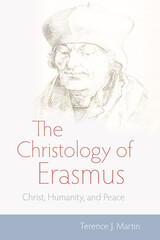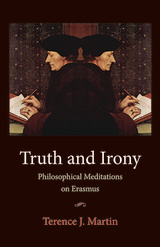2 books about Martin, Terence J.

The Christology of Erasmus
Christ, Humanity, and Peace
Terence J. Martin
Catholic University of America Press, 2024
Nothing is more central to the religious thinking of Erasmus of Rotterdam than the reality of Christ—in his eyes, that supreme revelation of divine mercy embodied in the life of Jesus of Nazareth to which Christian scriptures variously testify, but also the divine presence undergirding that life-centering ethic of love and peace, what Erasmus calls the “philosophy of Christ.” The purpose of this book is to distill the Christological elements from his vast corpus in a manner that shows the range, coherence, and value of Erasmus’ thinking on Christological questions. While Erasmus works within the broad parameters of orthodox teaching, his critical skills with languages, accent on rhetoric in theology, keen sense of irony, appreciation for the limits of human knowledge, incipient sense of history, emphasis on the welfare of humanity, and passionate defense of peace, give his work a distinctive stamp and thereby make a singular contribution to the history of Christology. What Erasmus contributes to discussions of the divinity of Christ is a counsel of restraint in metaphysical speculation, an accent on the revelatory breadth of the eternal Word of God, and an invitation to think of Christ incarnate as the eloquent oration of God. But the central impulse of the Christology of Erasmus is the affirmation of the full incarnation of Christ in human existence, abstaining as much as possible from docetic insulation of the divine from the struggles of human experience, in order to highlight the redemptive capacity of Christ for the transformation of human life. With that, the ethical capstone of Erasmus’ reflections on Christ centers on the responsibility to imitate Christ’s love for others, and thus for advancing the cause of peace in personal and social life. This books adds the voice of this remarkable Catholic humanist to the history of theological discussions in the early modern era, while also restoring its rightful place in the broader history of Christology.
[more]

Truth and Irony
Terence J. Martin
Catholic University of America Press, 2016
Tapping into selected works of Erasmus of Rotterdam, this book offers a series of philosophical meditations designed to retrieve and deploy a distinctively Erasmian manner of thinking - one that is capacious in its perception, agile in its judgments, and unsettling in its irony. In purpose, it takes a philosophical route, addressing perennial questions of self-knowledge - what we can know and how best to communicate what we take to be true, what we ought to do or how we should live, and what we might hope for or what would offer us fulfilment. In method, however, this work taps into the various strategies of irony at play in the works of Erasmus, looking for guidance in handling these age-old questions. What readers will find in Erasmus is a knack for playfully reversing appearances and realities, a penchant for pushing disturbing questions relentlessly to the limit, and a skill for juxtaposing oddly matched opposites. Again and again, Erasmus presses readers to rethink these fundamental questions with dexterity and nuance, ever ready to appreciate the surprising and unsettling upshot of ironic insight.
[more]
READERS
Browse our collection.
PUBLISHERS
See BiblioVault's publisher services.
STUDENT SERVICES
Files for college accessibility offices.
UChicago Accessibility Resources
home | accessibility | search | about | contact us
BiblioVault ® 2001 - 2024
The University of Chicago Press









